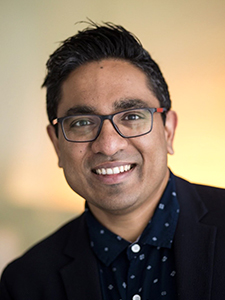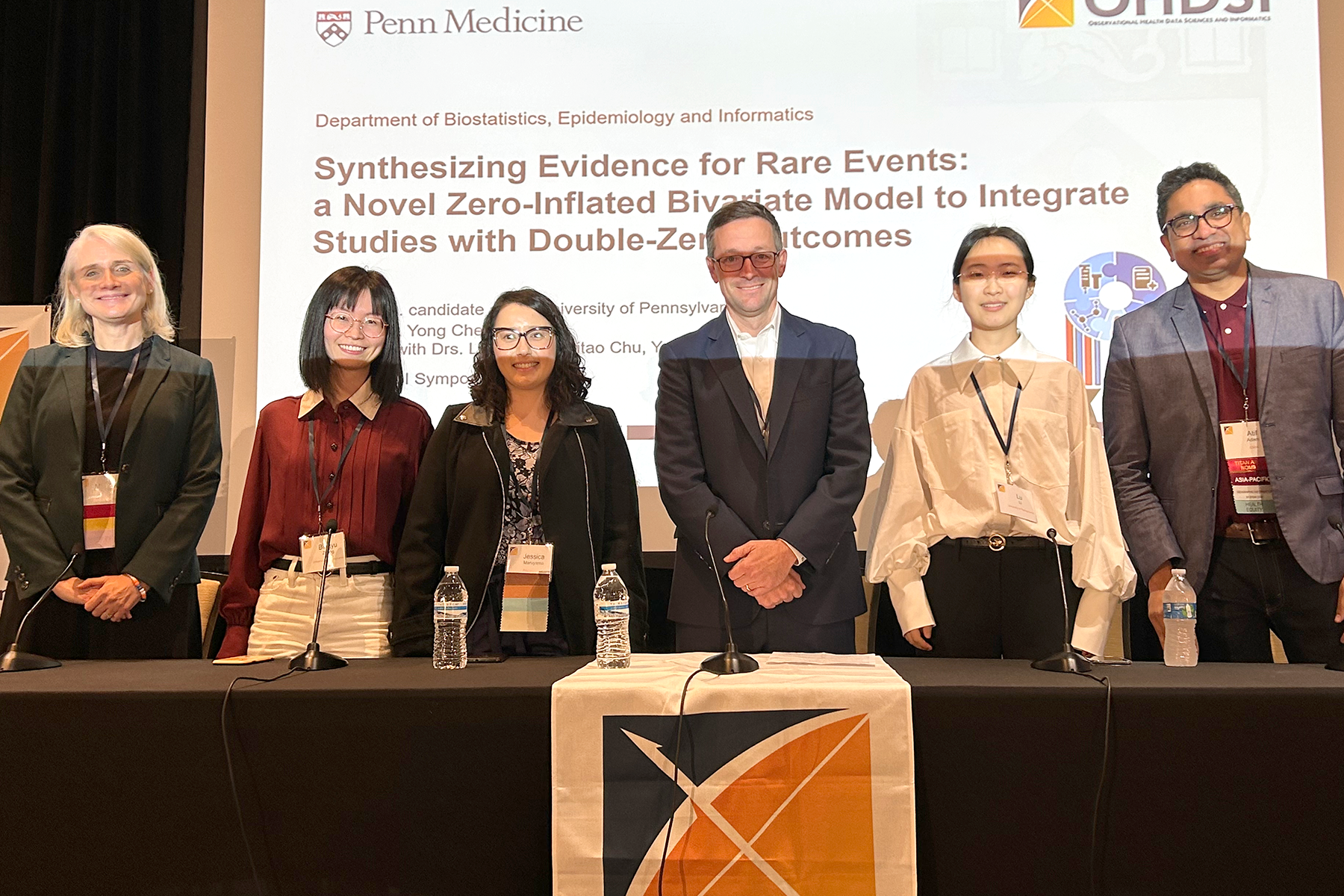- Who We Are
- Updates & News
- Standards
- Software Tools
- Network Studies
- Community Forums
- Education
- New To OHDSI?
- Community Calls
- Past Events
- Workgroups
- Tutorials
- 2025 ‘Our Journey’ Annual Report
- Current Events
- Support & Sponsorship
- 2025 Global Symposium
- 2025 APAC Symposium
- 2026 Global Symposium
- Github
- YouTube
- X/Twitter
- Newsletters
Collaborator Spotlight: Atif Adam
Dr. Atif Adam is a systems scientist and researcher boasting over a decade of diversified experience spanning academia, industry, and entrepreneurial ventures. He attained his doctorate in Health Systems Science and Computational Epidemiology. In addition, Dr. Adam completed his clinical training in Internal Medicine and secured master’s degrees in Health Policy and Spatial Epidemiology.
His research probes the nuanced relationships between chronic cardiometabolic diseases, mental health, cognitive aging, and health disparities. During his academic appointments at institutions such as Johns Hopkins and Harvard, Dr. Adam pioneered innovative simulation frameworks for cardiometabolic diseases and rigorously evaluated care pathways for the most vulnerable populations. To this end, he employs advanced statistical, geospatial, and systems modeling methodologies. Transitioning into the digital health space, Dr. Adam co-founded and assumed the role of Chief R&D Officer for the digital mental health startup, Rose Health. In this capacity, he harnessed large-scale data and sensor-based models to curate evidence-based digital solutions, primed for proactive patient monitoring.

In his present role as the Associate Director of Epidemiology at IQVIA, Dr. Adam channels his expertise to spearhead transformative real-world evidence (RWE) initiatives. Within the OMOP team at IQVIA, he merges his deep understanding of health systems, an unwavering commitment to health equity, and knowledge in data science to develop and deliver robust RWE studies at scale. Beyond mere discovery, Dr. Adam is ardently devoted to mentorship, nurturing, and guiding the forthcoming generation of health scientists towards a more informed and equitable healthcare horizon. He discusses his career journey, challenges in health equity and how OHDSI is dealing with them, advice for newcomers in OHDSI, and plenty more in the latest Collaborator Spotlight.
Can you discuss your career background and how you developed a passion for research?
During my clinical training, I found myself drawn to the world of research, particularly in public health and health systems. My deep dive into the intricacies of systems modeling during my doctoral work into the impacts of complex interventions across lifespans using advanced simulation techniques wasn’t merely an academic pursuit—it was the beginning of a realization. A realization that data, when interpreted with insight, can be a powerful tool in shaping policies that have a direct bearing on health outcomes. This early experience became the bedrock upon which I’ve built a decade-long journey, steering diverse research initiatives, from the nuances of chronic disease and the promises of digital health to the challenges of aging and the imperatives of health equity.
Yet, beneath the layers of data and methodologies, I’ve always understood health holistically: a tapestry of relationships. These relationships, whether with ourselves, our communities, the environment, or the healthcare landscapes we navigate, underpin our well-being. This perspective underscores the inherent duality of health—its simple essence of connectivity and the complexities of maintaining it as we journey through life. This duality, the art of nurturing connections amid evolving challenges, continues to captivate me, guiding my research endeavors and shaping my larger understanding of health.
How did you first become acquainted with the OHDSI community, and what drew you to become involved?
I first learned about OHDSI through colleagues and was immediately intrigued by the potential of this collaborative data network to generate robust real-world evidence on a massive scale. As someone devoted to leveraging data and analytics to advance health, I saw the immense value in harmonizing such diverse observational data sources into a cohesive structure that enables powerful multi-database studies. OHDSI’s open-source tools align with my dedication to advancing scientific progress through collaboration and transparency.
You have taken leadership responsibilities within the Health Equity workgroup. Making healthcare research more equitable is a critical need, but what are the biggest challenges in the area now, and how is the team trying to tackle them?
Addressing health equity, especially in healthcare research, is both a moral imperative and a complex challenge. Within the OHDSI Health Equity workgroup, one of the most pressing obstacles we’ve identified is the pervasive issue of data representation. Broad categorizations, especially in areas like race and ethnicity, have historically been oversimplified in the US and globally. This oversight can mask crucial disparities within groups, leading to missed opportunities to understand and address specific health challenges.
Moreover, our commitment to refining these classifications is deeply intertwined with fostering collaboration across diverse stakeholders. In the Health Equity workgroup, we prioritize collaborative endeavors with other workgroups within OHDSI, ensuring a comprehensive understanding and representation of equitable research in Real-World Evidence (RWE). Recognizing the power of RWE in shaping healthcare decisions, we actively engage with policymakers and public health stakeholders. This collaborative dialogue helps us understand the far-reaching implications of using RWE in crafting equitable healthcare policies. Through these engagements, we’ve come to appreciate not only the successes but also the shortcomings. Missteps and failures in this journey have been invaluable, providing learning lessons that continually refine our approach and vision. It’s a dynamic process of learning, adapting, and evolving, always aiming to achieve genuine health equity.
Tackling these multifaceted challenges is by no means a solitary endeavor. It demands a blend of collaboration and creativity. Our approach in the Health Equity workgroup is grounded in collective intelligence. We believe that by drawing from diverse experiences and expertise, we can identify and address the nuanced barriers to achieving accurate health equity in research.
How has the perspective around health equity changed in the last decade, and do you see more significant movement now on making necessary changes around it in observational research?
The evolution of health equity in the last decade, particularly within observational research, is marked by a pronounced shift from a narrow clinical focus to a broader, more integrative understanding. The emergent vision of a fully connected health system recognizes that accurate health equity requires embracing data from various spheres – individual, community, social, environmental, and policy. This expansive data vision seeks to transform siloed information into actionable intelligence, propelling healthcare toward both efficient and equitable decisions.
However, this forward momentum has also highlighted deep-rooted structural inequities. While data is becoming more expansive, it often mirrors societal biases, leading to potential pitfalls when interpreted without a nuanced lens. Especially with the rise of artificial intelligence (AI) in healthcare research, there’s a growing recognition of AI biases. Algorithms trained on biased data can perpetuate and even exacerbate existing disparities, casting shadows on the promise of AI in advancing health equity. Addressing this requires technical solutions and a foundational rethinking of how data is sourced, curated, and interpreted.
Concurrently, as the healthcare landscape becomes more connected, the issue of data privacy remains paramount. This isn’t about bending privacy rules but recalibrating them for contemporary challenges. We must marry the aspiration for broad data use with an unwavering commitment to individual privacy, always striving to refine, not overstep, the boundaries.
Furthermore, the role of patients is evolving, resonating with a more significant push towards data democratization. No longer just passive recipients of care, patients are emerging as custodians of their data. True health equity mandates fostering this sense of data ownership and ensuring patients are well-equipped to navigate the complexities of the healthcare ecosystem. This extends beyond mere access to records and delves into nurturing a culture of informed and responsible data stewardship.
The last decade has ushered in a renaissance in health equity perspectives. While observational research celebrates the strides made, it remains keenly aware of the challenges ahead—be it addressing structural inequities, mitigating AI biases, or redefining patient roles. The journey is ongoing, but with a vision grounded in inclusivity and innovation, the path ahead holds promise.

Atif Adam (right) was a member of the 2023 Scientific Review Committee, and he moderated a series of lightning talks at the Global Symposium.
You joined the scientific review committee for the global symposium this year, so what stood out about the variety of research you reviewed for the collaborator showcase?
Joining the scientific review committee for this year’s global symposium was a profound journey through cutting-edge developments in health research. As I sifted through the collaborator showcase submissions, it wasn’t just the breadth of topics that stood out but also the depth and diversity of approaches employed.
Beyond addressing intriguing questions and hypotheses, there was a noticeable emphasis on methodological innovations. Abstracts showcased a wide range of methods-oriented work, shedding light on enhancements to traditional models and introducing avant-garde techniques. This focus on refining and redefining methods signifies a maturing field, one that’s continuously introspecting and evolving.
Several submissions highlighted new collaborations, bringing together multifaceted teams with varied expertise. These collaborations spanned regions and bridged disciplines, underscoring the interdisciplinary nature of modern health research (including Generative AI). Adding new data assets enriched the research landscape, allowing for multifaceted analyses and richer insights.
For me, the collaborator showcase was a microcosm of the future of OHDSI and RWE research. From innovative hypotheses to pioneering methods and new collaborations to the application of advanced models, it was a vivid testament to the dynamism and promise of the global health OHDSI community.
You are relatively new to the community, but you recently joined the steering group and are helping plan the direction of the community. Can you share what it takes for a new person to jump in and start making an impact and what inspired you to do so?
While my time in the OHDSI community is relatively brief, the environment struck a chord with me immediately. What stands out is how the community welcomes expertise from myriad backgrounds. Whether you’re a seasoned researcher, a data scientist, a clinician, or even someone just starting in healthcare analytics, OHDSI is a platform where different levels of familiarity converge to nurture actionable knowledge.
Engaging with the various workgroups, events, and projects provides an avenue for personal and professional growth. It’s an immersive experience that allows members to contribute and learn simultaneously. Granted, the abundance of opportunities might seem overwhelming initially, but therein lies the magic of this community. Every newcomer, including myself, is met with many welcoming faces, eager to guide, collaborate, and build confidence.
This potent mix of inclusivity and dynamism inspired me to join the steering group. My background in modeling and health equity offered a lens through which I could contribute, but the collective spirit of OHDSI indeed fueled my involvement. To all newcomers: Dive deep into the plethora of opportunities here. No matter your background or expertise level, there’s a place for you in OHDSI. Embrace the learning curve, lean on the supportive community around you, and chart your unique path within this collaborative ecosystem.
What are some of your hobbies, and what is one interesting thing that most community members might not know about you?
While work often takes center stage in my life, I’ve always cherished the joys of reading. Books, for me, are gateways to diverse worlds and insights. My fondness for literature frequently draws me to local bookstores, where I can browse for hours, discovering new titles and authors. Alongside this, I find a simple pleasure in visiting coffee shops and tucked-away eateries – places with characters and stories of their own.
Recently, I embraced the joyous challenge of fatherhood, welcoming a beautiful daughter into my world. Every day with her offers a new experiment in joy and learning, and she has swiftly become the source of my most cherished moments and lessons.
Now, for an intriguing tidbit that might surprise many in the community: I can practice medicine in more countries than legally drive in!
